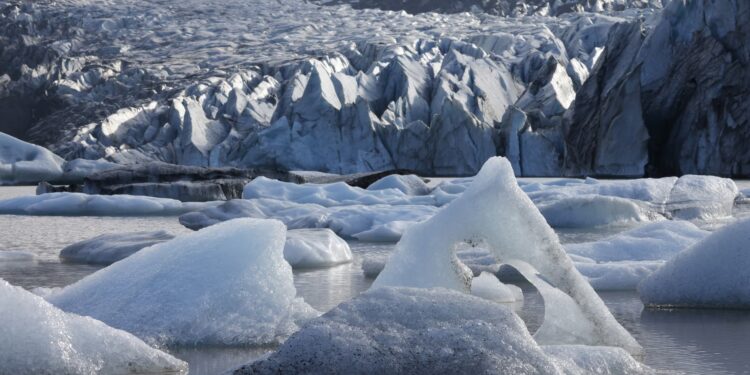Decades-long research shows the world’s glaciers collectively lost 6.542tn tonnes of ice between 2000 and 2023
Melting glaciers caused almost 2cm of sea level rise this century, study reveals
Decades-long research shows the world’s glaciers collectively lost 6.542tn tonnes of ice between 2000 and 2023
Melting glaciers have caused almost 2cm of sea level rise this century alone, a decades-long study has revealed.
The research shows the world’s glaciers collectively lost 6.542tn tonnes of ice between 2000 and 2023, causing an 18mm (0.7in) rise in global sea levels.
The world’s glaciers lost an average of 273bn tonnes of ice every year – the equivalent of 30 years of water consumption by the entire global population.
The assessment, led by scientists from the University of Edinburgh and the University of Zurich, found that so far this century, glaciers have lost approximately 5% of their total volume. Regional losses were highly variable; the Antarctic and subantarctic islands lost 2% of their volume but central Europe’s glaciers lost 39%.
“These numbers are staggering. They serve as a reminder that things are changing fast in some regions,” said Prof Noel Gourmelen, the co-lead author of the study and personal chair of Earth observation at the University of Edinburgh’s School of Geosciences.
A stark contrast in the amount of ice lost each decade was also discovered, with 36% more ice having melted between 2012 and 2023 compared with the previous decade.
“This is really important as it confirms the pace of glacier melting is accelerating over time,” said Prof Andrew Shepherd, head of the Department of Geography and Environmental Science at Northumbria University. “Even small amounts of sea level rise matter because it leads to more frequent coastal flooding. Every centimetre of sea level rise exposes another 2 million people to annual flooding somewhere on our planet.”
Glacier loss also leads to a depletion in regional freshwater supplies for remote communities and those who already face water scarcity.
“Around 2 billion people depend on meltwater from glaciers and so their retreat is a big problem for society,” said Shepherd. “It’s not just that we are losing them from our landscape, they are an important part of our daily lives.”
“Glaciers are also important for power generation,” said Gourmelen. “For instance, 70% of electricity in Iceland comes from hydropower. They rely on the water melt from glaciers to function. You have this in the Andes as well as parts of Europe, such as Switzerland.”
Published in the journal Nature, the latest research is part of the Glacier Mass Balance Intercomparison Exercise – known as Glambie. It combines and analyses data available from field measurements as well as optical, radar and laser satellite missions.
After ocean warming, melting glaciers are the second largest contributor to global sea level rises.
“This research is concerning because it predicts further glacier loss,” said Martin Siegert, professor of geosciences at the University of Exeter. “Two centimetres might not sound a lot, but this is the contribution from small glaciers – not the whole of the ice on the planet or that from Greenland and Antarctica.”
“Glaciers have a real impact,” says Gourmelen. “They are a biometer for climate change, so the findings are a measure of the impact climate change has had over the past 20 years.
“As we take action to try to mitigate this, following glacier activity will be a way of measuring our effectiveness in dealing with a changing climate.”
Source: The Guardian




Recent Comments